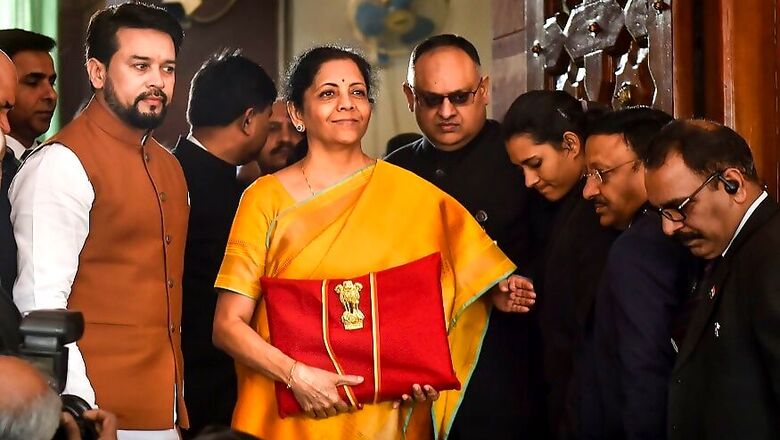
views
All eyes were on Finance Minister Nirmala Sitharaman today as she was expected to wave a magic wand and take away all the troubles plaguing the Indian economy.
India has been in the grip of a slowdown and though the government has taken numerous steps outside the budget exercise to boost specific sectors and also kick-start demand, the economy has continued to chug along in the slow lane. The GDP growth came in at a six-year low of 4.5% in the September quarter.
On its part, the Reserve Bank of India has already done the heavy lifting by cutting lending rates successively for five times, and the onus was naturally on the government to take on some burden. There were widespread expectations of a fiscal stimulus from the finance minister when she rose to speak this morning.
Was she able to provide this stimulus?
DK Srivastava, Chief Policy Advisor, EY India did not think so. He said the extent of the stimulus provided remained marginal since the proposed increase in capital expenditure was marginal. This, despite the FM announcing a major (though expected) slippage in India's fiscal deficit target by five percentage points to 3.8% for 2019-20.
She has again targeted the fiscal deficit at five percentage points higher than the earlier target for 2020-21 at 3.5%.
Srivastava said, "In spite of slippage in the fiscal deficit for FY20 and FY21 by margins of 0.5% points each from their respective targets at 3.3% and 3% of GDP, the extent of stimulus provided by Union Budget FY21 has remained marginal. There are small increases in capital expenditure as percentage of GDP amounting to 0.1% point of GDP both in FY20 and FY21 as compared to the preceding years... Moreover, the quality of fiscal deficit is projected to deteriorate in FY21 as compared to FY20. The share of revenue deficit in fiscal deficit is expected to increase to 77% in FY21 (BE) as compared to 63% in FY20 (RE).”
Shanti Ekambaram, president of Consumer Banking, Kotak Mahindra Bank said the budget has tried to address several themes but lacks any "big bang" announcement. "A lot was expected on the big boost to infrastructure, but perhaps the devil is in the details."
Now let us look at whether the much-publicised income tax sops should cheer the salaried middle class. Sitharaman has been asserting that her income tax proposals would put more money in the hands of the aam aadmi, thereby boosting consumption and helping the economy.
She said during her speech this morning "people of India have unequivocally given their jan-aadesh for not just political stability and also reposed faith in our economic policies. This is the budget to boost their incomes and enhance their purchasing power. Only through higher growth can we achieve that and have our youth gainfully and meaningfully employed."
But Girish Vanvari, founder of Transaction Square, said the impact of the income tax tweaks will vary from person to person. "If someone is claiming deductions like HRA, standard deduction, housing deduction etc, then the benefit may not be significant".
He calculated total tax outgo on an income of Rs 15 lakh per annum under the new regime (with no exemptions and lower tax rates) versus the old regime (with exemptions) to show that the outgo would be higher under the new regime. So does this mean that the FM’s claim of putting more money in the hands of the aam aadmi is hollow?
According to the budget numbers, nearly 17% of the government's income comes from personal income tax. Only about 4% Indians pay any tax on income and the expectation for relief was thus high among the salaried middle class. The proposed relaxation in income tax slabs would translate to Rs 40,000 crore revenue foregone for the government.
Takeaway from Budget speech are following:1. Govt. has given up on reviving economy or accelerating the growth rate or promoting private investment or increasing efficiency or creating jobs or winning a greater share of world trade: @PChidambaram_IN#SeedhiBaatBudgetBakwaas pic.twitter.com/sMIL09DUo3— Congress (@INCIndia) February 1, 2020
Former finance minister P Chidambaram also alleged that the FM has not acknowledged the twin challenges the economy is faced with today --constrained demand and lack of investments -- and has thus not proposed any solutions for these problems.
But Prime Minister Narendra Modi asserted that the budget would revive the economy and boost job creation.
मुझे विश्वास है कि ये बजट Income और Investment को बढ़ाएगा, Demand और Consumption को बढ़ाएगा, Financial System और Credit Flow में नई स्फूर्ति लाएगा।ये बजट देश की वर्तमान आवश्यकताओं के साथ ही इस दशक में भविष्य की अपेक्षाओं की पूर्ति करेगा: PM @narendramodi #JanJanKaBudget— PMO India (@PMOIndia) February 1, 2020
Whether the budget pronouncements will actually help in boosting the economy remains in doubt. It would be safe to say that there would be a marginal impact on growth, if at all, and that the economy is still some way off from revival. Till the government acknowledges there is a slowdown and actively works towards tackling it, piecemeal measures won’t work.
(The author is a senior journalist. Views are personal)













Comments
0 comment